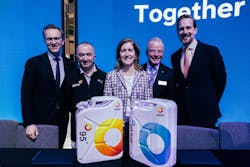Boeing and Zero Petroleum announce SAF testing partnership
DUBAI, United Arab Emirates - The Boeing Company in Arlington, Virginia, and Zero Petroleum in London announced at the Dubai Airshow their collaboration for testing and analyzing the next generation of technologies for sustainable aviation fuels (SAF).
Zero’s technology produces SAF from air and water. The hydrocarbon fuel obtains carbon from direct air capture and hydrogen from water electrolysis. This power-to-liquid process has the potential to significantly reduce emissions across the lifecycle, provided there is an abundance of renewable electricity.
Under the agreement, Boeing will jointly establish a testing program for Zero’s SAF at the University of Sheffield’s Energy Innovation Centre (EIC) and its SAF research facility. Boeing is a founding member of the center.
“SAF is our industry’s biggest lever in reducing emissions today and into the future, but we need more of it now to enable those reductions,” said Sheila Remes, Boeing vice president of Environmental Sustainability. “Working with innovators around the world such as Zero is crucial as we collaborate to develop new, sustainable pathways to produce and scale-up SAF.”
The Oxfordshire, UK-based energy company will benefit from Boeing’s initiative to help innovative fuel producers test, mature and scale SAF utilizing its collaboration with the EIC and Boeing’s global SAF and aerospace expertise.
“The aviation industry needs to move quickly to meet upcoming mandates for de-fossilization and synthetic fuels provide the only fully scalable solution,” said Paddy Lowe, CEO of Zero. “We have already developed and tested our 100% drop-in synthetic jet fuel and collaborating with Boeing will now enable us to accelerate the qualification process and put us on course for commercial delivery by 2026. Our collaboration with Boeing sets an industry precedent for the recognition and support for synthetic fuels in the global pivot to sustainable solutions.”
